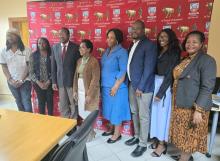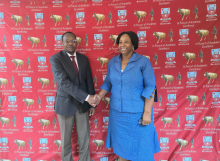WHO Representative pays courtesy call on WHO Collaborating Centre for Nursing and Midwifery Development at the University of Botswana School of Nursing
On 28 April 2025, WHO Country Representative, Dr. Fabian Ndenzako, paid a courtesy visit to the University of Botswana School of Nursing, a WHO Collaborating Centre (WHOCC) for Nursing and Midwifery Development since 1990. He was accompanied by Dr. Juliet Bataringaya, Health Systems Advisor, and Ms. Boingotlo Ramontshonyana, Focal Point for District Health System Strengthening.
Dr. Ndenzako was welcomed by Professor Magowe, Dean of the Faculty of Health Sciences; Professor Phaladze, Deputy Dean; Dr. Samuel Matula, Head of the School of Nursing; Ms. Mosidi Mokotedi, WHOCC Coordinator; and other faculty members. In her welcome remarks, Prof. Magowe provided an overview of the Faculty of Health Sciences, which encompasses the School of Nursing, School of Allied Health Professions, School of Pharmacy, and School of Public Health. She highlighted that the School of Nursing, established in 1978, is the oldest within the faculty. Its core mission is to produce highly skilled and well-rounded health professionals to serve Botswana, the African continent, and beyond. The school aligns its undergraduate and graduate training with international standards and promotes robust research to inform evidence-based curricula. The faculty also offers graduate programs, including master’s and PhD degrees.
Dr. Matula elaborated on the evolution of the School of Nursing, noting that it began as the Department of Nursing Education in 1978 and became a full-fledged school in 2007. The school offers both undergraduate and postgraduate degrees, including the Bachelor of Nursing Science and the Master of Nursing. A PhD programme is also expected to be launched soon. Notably, the Master of Nursing in Gerontology and Palliative Care was introduced in August 2024.
Designated in 1990, the School of Nursing is a WHO Collaborating Centre for Nursing and Midwifery Development in Sub-Saharan Africa. Among its contributions, the school developed a model for home-based care that has been shared regionally. It has played a vital role in introducing nursing education in higher institutions across the East, Central, and Southern Africa (ECSA) region, and has supported the establishment of National Nurses Associations and Nursing and Midwifery Councils. The school has been instrumental in standardizing nursing and midwifery curricula and strengthening regulatory frameworks.
The school is a member of key regional networks such as the Consortium for Higher Education in Nursing and Midwifery in Africa (CHENMA) and the Eastern, Central, and Southern Africa College of Nursing (ECSACON). It has mobilized resources for projects such as the Adolescent Health and HIV/AIDS Project and the Project for Nursing Leadership. Collaborations extend beyond the government to include the University of Pennsylvania, Rutgers University, the University of Michigan, the Cancer Association, and various NGOs.
From 2018 to 2022, the WHOCC focused on strengthening the role of nursing and midwifery in reducing the burden of Non-Communicable Diseases (NCDs), promoting health and wellness across the lifespan, and enhancing maternal, newborn, child, and adolescent health services. These efforts were carried out in collaboration with other WHOCCs, civil society organizations, and development partners.
Under its current designation (March 2022 to February 2026), the WHOCC is working towards three core objectives:
1. Conducting collaborative research on the impact of the COVID-19 pandemic on the nursing and midwifery workforce.
2. Strengthening nursing and midwifery leadership in line with WHO’s Strategic Directions for Nursing and Midwifery (2021–2025).
3. Promoting rehabilitative and palliative care services within the context of revitalized Primary Health Care.
Dr. Matula reported notable progress. For the COVID-19-related research, the school conducted literature reviews and co-authored three publications. It also assessed leadership gaps among nurses, with one publication underway. Leadership development efforts included benchmarking training qualifications and materials used in Botswana against international resources, such as those from the South Pacific GNWHOCCNM and Kamuzu University of Health Sciences. A pilot leadership workshop was conducted, and its outcomes documented.
To strengthen rehabilitative and palliative care, a needs assessment was carried out, leading to the development of a specialized Oncology and Palliative Nursing curriculum. Dr. Matula acknowledged that while implementation was delayed by prolonged COVID-19 response efforts and funding constraints, global WHOCC networks and partnerships with communities and stakeholders remain valuable enablers for progress.
In his remarks, Dr. Ndenzako commended the School of Nursing for its 35-year tenure as a WHO Collaborating Centre. He noted that Botswana currently hosts two WHOCCs, the second being the Botswana National HIV Drug Resistance Laboratory, designated in 2023. He praised the school’s research outputs and emphasized their importance in informing WHO policies.Dr. Ndenzako highlighted the changing global health financing landscape, which calls for stronger partnerships to advance the health agenda. He encouraged the school to document and publish its 35-year journey to share lessons with other institutions. He reaffirmed WHO’s commitment to supporting the WHOCC’s continued efforts.
In closing, Dr. Sebego thanked WHO for its ongoing collaboration and underscored the need to sustain and strengthen the partnership.





